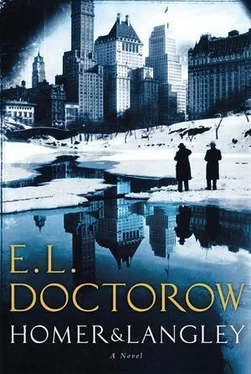We brought home our contraband through the basement door under the front steps. We would have enough water for drinking, and all our meals thenceforth would be on paper plates and with throwaway plastic utensils, though we didn’t exactly throw them away, but water for commode flushing and for bathing was another matter. It was the ground-floor guest bathroom that we would try to keep functioning, which was just as well, as the upstairs bathrooms had long since served also as storage areas. But sponge baths were the order of the day and after a couple of weeks of turning ourselves into water carriers, the sense of triumph, of having put one over on the city, had given way to the hard realities of our situation. Of course there was an ordinary drinking fountain not far into the park across from our house and we used that to fill our thermoses and army canteens, though sometimes as the weather grew warmer we had to wait our turn as flocks of children with a perverse interest in water fountains pretended to be thirsty.
I DON’T KNOW IF any of the children who took to throwing stones at our shuttered windows were the same who had seen us come for water in the park. Most likely the word had spread. Children are the carriers of unholy superstition, and in the minds of the juvenile delinquents who’d begun to pelt our house Langley and I were not the eccentric recluses of a once well-to-do family as described in the press: we had metamorphosed, we were the ghosts who haunted the house we had once lived in. Not able to see myself or hear my own footsteps, I was coming around to the same idea.
At unpredictable times through the summer the assault would begin, the operation planned and the ordnance collected beforehand, because the clunks and thwacks and thuds came as a barrage. I could feel them. Sometimes I could hear the bel canto cries. I figured their ages to be from six to twelve. The first few times, Langley made the mistake of going out on the stoop and shaking his fist. The children scattered with screams of delight. So of course the next time there were even more of them and more rocks flew.
We had no thought of calling the police, nor did they of their own volition ever appear. We settled back and endured these sorties as one would wait out summer showers. So now, it’s even their children, Langley said, having assumed the little beasts lived in the surrounding houses and might have been inspired by their parents’ opinion of us. I said my understanding of people of the class of our nearest neighbors was that they were not given to breeding. I said I thought it was a wider recruitment and the children’s staging area was probably the park. When one day the rocks seemed to have a heftier impact, and I heard a shout in a deeper post-pubescent register, Langley lifted one of the shutter slats, peered out, and informed me that some of them were easily teenagers. So you are right, Homer, this may be citywide, and we have the rare privilege of an advanced look at the replacement citizenry for the millennium.
Langley began to think of a military action in response. He had collected a few pistols over the years and decided to take one and stand on the steps and wave it at the hoodlums to see what would happen. Of course it is not loaded, he said. I said he could do that — menace children with a deadly weapon — and that I would be happy to visit him in prison if I could find a way to get there. I was not inclined to fret over these stone throwers. The shutters had been well pocked and some of the brownstone frontage had been chipped but I knew the children would vanish when the weather grew cold, as they did, it was strictly a summer sport, and soon enough the thuds of rocks against the shutters were replaced by autumnal winds blowing through them and shaking our windows.
—
BUT ONE NIGHT SOMETHING Langley had said came back to me as I tried to sleep. He said everything alive was at war. I wondered if the diminution of my senses, even as I was terrified of an enlarging consciousness slowly displacing the world outside my mind — if it was possible that I was becoming progressively unaware of the truth of our situation, the magnitude of it, protected in my insensitivity from the worst of its sights and sounds. As I reflected, the stoning of our house by children, rather than being an episode incidental to our major concerns — our increasing isolation, losing by our own doing or the doing of others the ordinary services of an urban civilization, no running water, I mean, no gas, no electricity — and finding ourselves in a circle of animosity rippling outward from our neighbors to creditors, to the press, to the municipality, and, finally, to the future — for that was what these children were — rather than being of minor significance, well, that was the most devastating blow of all. For what could be more terrible than being turned into a mythic joke? How could we cope, once dead and gone, with no one available to reclaim our history? My brother and I were going down and he, lung-shot and half insane, knew that better than I. Our every act of opposition and assertion of our self-reliance, every instance of our creativity and resolute expression of our principles was in service of our ruination. And he, apart from all that, had as his burden the care of an increasingly disabled brother. I will not criticize him then for the paranoia of that winter when he began to devise from the hoarded materials of our life in this house — as if everything here had been amassed in response to a prophetic intelligence — the means of our last stand.
In the old days there was another poet he liked to quote: “I’m me, and what the hell can I do about it! … I, the solemn investigator of useless things.”
MY OWN RESPONSE has been to press on with my daily writing. I am Homer Collyer and Jacqueline Roux is my muse. Though in my weakened state I am not sure if she ever returned as she said she would, or if I only needed the thought of her to begin this writing, a project comparable in its overreaching to Langley’s newspaper. At this point I can’t be sure of anything — what I imagine, what I recall — but she did come back, I’m almost sure of that, or let us say she did, and that I met her at the front door, having been groomed and turned out in some reasonable state by my understanding brother. Sitting in the chill of this house, I feel the warmth of a hotel lounge. Jacqueline and I have had dinner. There is a fireplace, arrangements of upholstered armchairs, small low tables for drinks, and a pianist playing standards. I remember this one from the time of our tea dances: “Strangers in the Night.” I can tell from the stiffness of the playing that this is a classically trained pianist trying to make a living. Jacqueline and I laugh at the chosen song — the lyrics describing strangers exchanging glances, which is not possible between us, and ending up as lovers for life. That too is funny though in a way to stifle the laughter in my throat.
Then, on my second glass of the best wine I have ever tasted, I am impelled to sit at the piano after the hired help has withdrawn. I play Chopin, the Prelude in C-sharp Minor, because it is a slow chord-heavy piece that I can be reasonably sure of, not being able to hear it very well. Then I make the mistake of going into “Jesu, Joy of Man’s Desiring,” which requires a digitally meandering right hand: a mistake, because I understand from the touch on my shoulder — this is the lounge pianist stopping me — that I’m doing the sequence as Bach wrote it but I have started off on the wrong piano key. It is like a mockery of Bach. I am corrected and finish capably enough, but am led back to Jacqueline in total humiliation that I try to dissemble by laughing. What wine will do!
In her room I confess to my misery, a blind man going deaf.
Читать дальше












